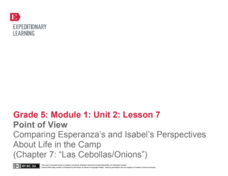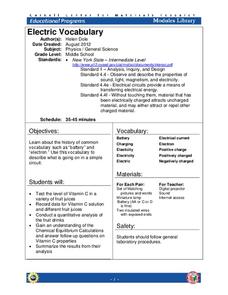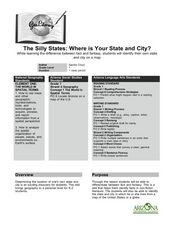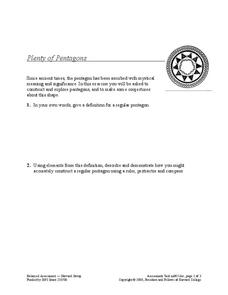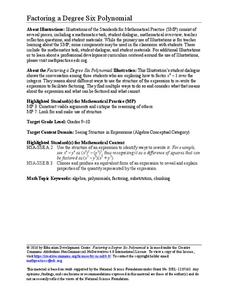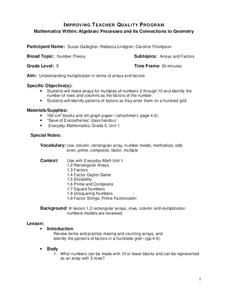Curated OER
Making Sense of Homographs
What is a homograph? Develop your learners' vocabulary with a word association tool. Language arts classes discover what a homograph is and how it can be used as a visual thesaurus. They discover the other uses for homographs...
Curated OER
Square Roots
Students differentiate between perfect roots and rational roots. In this algebra lesson, students perform operation using roots. They add, subtract, multiply and divide rational expressions.
EngageNY
The Decimal Expansion of Some Irrational Numbers
Develop a definition of irrational numbers through an exploration of square roots. The 11th lesson in this series of 25 asks scholars to estimate the value of a square root. Learners observe as the estimation extends further and further...
Los Angeles Unified School District
Capitalism and Socialism
Capitalism, socialism, communism ... these may seem like a whole bunch of isms to your scholars. High schoolers won't confuse them after completing an informative resource. Your class masters how to use primary sources to...
Virginia Department of Education
Matching Representations
Pupils explore the many representations of linear functions by completing a matching activity to connect the multiple representations of a function. They then reinforce the connection as individuals create the different representations...
EngageNY
Point of View: Comparing Esperanza's and Isabel's Perspectives About Life in the Camp (Chapter 7: "Las Cebollas/Onions")
Explore point of view and more with a Common Core-designed instructional activity. Learners experience different points of view by representing one of two characters from Esperanza Rising during a partner discussion. They must use...
National History Day
Propaganda Posters of World War I: Analyzing the Methods Behind the Images
The power of a picture. During the events surrounding World War I, propaganda posters were widely distributed in American society to sway the emotions of its citizens. By analyzing World War I propaganda posters in the first installment...
Curated OER
Digestion - Part 3
Students explore the human body by reviewing the digestive system. In this human anatomy lesson, students identify the elements of human digestion by completing two body system worksheets. Students read the story What Happens to a...
Cornell University
Electric Vocabulary
Practice electric vocabulary using multiple methods. Learners begin by watching a video that explains vocabulary related to electric currents. They match vocabulary cards to practice and then create an electric circuit. Using the...
5280 Math
Capture the Points
Play a game of capture the points. Young scholars receive a number line with specific points graphed and must write an inequality that captures all the points. The second task of the algebra project is to write an inequality with...
Curated OER
The Silly States: Where Is Your State and City?
First graders read The Scrambled States of America and discuss whether it is real or fantasy as compared to the United States. In this geography lesson, 1st graders identify their city or state on a map and work in groups to color the...
Curated OER
Crossing the Delaware with Historic, Cultural, and Personal Interpretations
Sixth graders discover the importance of information sources by researching the United States History. In this research gathering instructional activity, 6th graders examine a historical painting of George Washington and analyze...
Curated OER
EPub--Stuart Little
Following a detailed activity and reading guide students will better grasp their reading of the book Stuart Little. They visit a series of web sites to gain a mouse's perspective then create a Mouse Movie with an iPod camera and Keynote....
Curated OER
Patterns
Fourth graders investigate patterns and sequences. In this patterns and sequences lesson, 4th graders use a hundreds chart to build recurring patterns. Students skip count by threes and fives on a hundreds chart by coloring...
Balanced Assessment
Plenty of Pentagons
Why are only four colors needed to color webs from regular pentagons, not five? An assessment task requires young mathematicians to first construct regular pentagons using a compass and straightedge, then has them consider a shape...
Education Development Center
Factoring a Degree Six Polynomial
Within collaborative groups, scholars factor a degree six polynomial. They can factor the polynomial using many different strategies — a great way to prompt mathematical discussion.
Curated OER
Mathematics Within: Algebraic Processes and Its Connections to Geometry
Fifth graders discover the connections between algebra and geometry. With a focus on arrays and factors, they are introduced to multiplication. They develop an array for multiples of 2 through 10 and identify the factors of each row....
Curated OER
Extract Your Own DNA from Cheek Cells
Young scholars observe their own DNA. In this DNA lesson, students learn the simple method of DNA extraction and explain why DNA extraction is important to scientists.
Curated OER
Strawberry DNA extraction
Students study the basic function of DNA and then extract it from strawberries. In this DNA extraction instructional activity students examine DNA and see why the extraction of it is so important to scientists.
101 Questions
Oversize Tires
Big vehicles require some big tires. Given a picture of a flatbed hauling a large tire, scholars discuss and estimate the size of the tire. They then use information and video about the tires to estimate the height of a vehicle that uses...
Facing History and Ourselves
Tactics of Nonviolence
High schoolers analyze the direct action tactics of nonviolence. As a class, they distinguish between a strategy and a tactic and identify tactics used during the civil rights movement. They relate these tactics and how they might be...
Curated OER
Meso-America
Students will identify and locate Central and South America and their countries and features, as well as Meso-American civilizations. Students will compare civilizations and discuss voyages of relevant explorers.
Curated OER
Unit Circle Lesson Plan
Students identify different locations on a unit circle. In this precalculus lesson, students identify the different trig properties and rewrite the equation of a circle in standard form. They use mnemonic devices to help them...
Curated OER
Shadow Trackers: From Photography to Writing
Students explore the rotation of the earth. In this science instructional activity, students view photos of various places around the world. Students conduct an experiment in which they can see how the earth's rotation creates shadows on...





